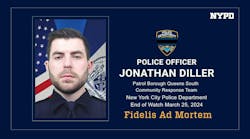New Hampshire has more than 60 law enforcement officers with credibility issues so serious they could jeopardize their ability to testify at trials, but the process tracking them is so secretive it is virtually impossible to identify them or even say for sure exactly how many there are.
When first asked by a reporter, most of the county attorneys refused to provide even the number of those officers in their counties, but did so after consulting with Deputy Attorney General Ann Rice.
Called potential "Laurie" issues, the attorney general and the 10 county attorneys are required to keep lists of law enforcement officers who have lied under oath, committed theft or fraud or other conduct that could affect their truthful
ness, according to former Attorney General Peter Heed's 2004 policy.
A judge could ultimately require the officer's confidential personnel information be turned over to the defense. The defense could then use the information in an effort to impeach the officer's credibility.
Rice said her office doesn't keep a complete Laurie list of all such officers statewide as outlined in the Heed memo. Instead, Rice sends out "Laurie letters" to determine whether any of the officers who are to testify have potential Laurie matters in their personnel files.
Rice also said she wasn't aware that the state police department wasn't reporting the two troopers with potential Laurie issues to all 10 counties, which was also directed in the Heed memo. Rice didn't know how many officers with potential Laurie issues are working in the state.
"The Laurie list is not huge," Rice said. "It would be unfortunate if this is being portrayed that we have a lot of bad cops."
The purpose of the Laurie lists is to make sure the defense can be alerted beforehand if an officer with credibility issues is going to testify. They have no other purpose, she said.
"It was not intended to label some as bad cops or bad police departments," Rice said.
Training is provided to police chiefs, who are supposed to report such officers to prosecutors, Rice said.
"It is a policy," Rice said. "They should be doing it, but there is no penalty for not doing it other than the integrity of the prosecutions."
Former Strafford County Attorney Lincoln Soldati said law enforcement officers and other public officials should be held to a higher standard when it comes to troubling conduct that is buried - and protected by law - in their personnel files.
Soldati, now a Portsmouth defense attorney, remembers one police department years ago that deliberately kept two sets of personnel files to avoid Laurie disclosures.
"There ought to be a different standard for public employees when it comes to the protection of personnel records," Soldati said. "It seems too often the rules are used to protect the institution. The individual not so much."
Rockingham County Attorney Jim Reams said there are names on the lists that a judge may easily determine should not be disclosed under Laurie procedures.
"To make an error on a Laurie decision is egregious," Reams said. "It could mean a new trial or dismissal of the case. The entire system is designed to over-report Laurie violations so there are likely more names on the lists than what would not be legitimate."
No major Rockingham County cases have been affected by Laurie issues, he said.
But Hillsborough County Attorney Dennis Hogan knew of at least one prosecution that was harmed by an officer with a Laurie issue.
"The case got dropped," Hogan said. "It does happen."
Hogan said 39 law enforcement officers have potential Laurie issues in Hillsborough County. Eighteen work for the Manchester Police Department, he said.
Hillsborough County has 724 full-time sworn law enforcement officers, the most of any county in the state. Statewide there are 2,838 full-time, sworn officers, according the Police Standards and Training.
The numbers of police with potential Laurie issues provided by the county attorneys suggest that some keep names on the list longer than others, although they can be removed after 10 years.
Some reported more state troopers than did state police. Since the lists are held in the strictest confidence, there is no way to cross-check the names.
Assistant Safety Commissioner Earl Sweeney said in the future, state police will report to all counties, as outlined in the Heed memo as a result of the Sunday News inquiry.
Reams said the Rockingham County list contains the names of 17 officers, and Merrimack County Attorney Scott Murray said he had none.
Coos County Attorney Robert Mekeel, with only 56 sworn full-time officers countywide, also said he had no officers with potential Laurie issues.
"As far as I know, there has never been one in Coos County," Mekeel said. "It's not my job to run around finding out."
Officers have only potential Laurie issues until a judge decides the conduct is definitely information that should be disclosed. Many of the names on the lists have not been tested by a judge because they haven't been scheduled to testify, prosecutors say.
Heed's memo was intended to help police chiefs and prosecutors identify, track and disclose Laurie material, Rice said.
Prosecutors didn't want to repeat the mistakes that led to State v. Laurie in 1995, in which the state Supreme Court overturned a murder conviction because information about the credibility of one of the testifying officers, which is considered evidence favorable to the defense, was withheld.
Laurie matters usually go to an officer's truthfulness, Rice said. Having an extramarital affair outside of work hours normally would not be considered a Laurie issue, she said.
Nashua attorney Tim Goulden views Laurie in a different light because he was a Nashua police officer for many years before switching careers.
Having a Laurie issue can ruin a police officer's career, he said. Goulden knew of one officer who wasn't told his name was on a Laurie list.
"He is then a liability to the police department," Goulden said.
Soldati believes lawmakers should consider exempting certain police personnel information from confidentiality protection when it involves issues of honesty and integrity.
Too often personnel files are used to protect police and police departments, Soldati said, not the defendants or the public.
But Sweeney said there are good reasons for protecting police personnel records.
"We really don't want to smear someone for life if a judge determines the matter isn't a Laurie issue," Sweeney said.
As to Soldati's perception that police protect their own, Sweeney said those days are gone.
"I think it's a lot less than it was years ago," Sweeney said.
"There is much more emphasis now on ethics, and we are so much more careful in screening applicants today."
Copyright 2012 Union Leader Corp.All Rights Reserved



